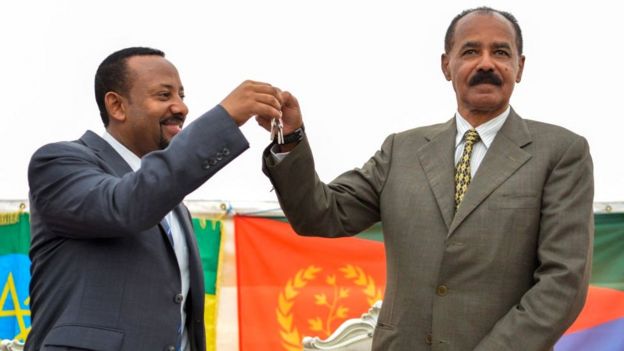Date: Saturday, 23 March 2019
.
 Prime Minister Abiy (l) initiated moves to meet Eritrea's President Isaias Afwerki in order to secure peace
Prime Minister Abiy (l) initiated moves to meet Eritrea's President Isaias Afwerki in order to secure peaceIt has been widely argued that the United States shouldn’t seek its friends among demagogues like this week’s guest in the Oval Office, Brazilian President Jair Bolsonaro—who was celebrated by U.S. President Donald Trump’s National Security Advisor John Bolton at his inauguration in January, even as Bolsonaro used his first day in office to roll back protections for racial minorities and LGBT people. Or like Poland’s right-wing government, which the Trump administration chose to host its Middle East summit last month despite the ruling government’s attempts to purge the country’s judiciary and criminalize speech recognizing Poles’ role in the Holocaust.
But seeking the right friends is just as important as avoiding the wrong ones. The United States needs to seize opportunities when they arise to help leaders and nations taking risks to achieve democratic progress. Instead of treating people’s democratic aspirations primarily as a cudgel to topple regimes or undercut enemies, the United States should also recognize the long-term potential to strengthen partnerships and friendships.
Ethiopia, Africa’s second-most-populous nation, is one such case. It could become the anchor of a more peaceful, less bitterly divided Horn of Africa—or descend back into dictatorship, mass migration, or even civil war. Ethiopia has Africa’s fastest-growing economy but also surpassed Syria to become the world’s top displacer of people in 2018 due to ethnic violence.
On a recent trip to Addis Ababa, I heard from one Ethiopian after another how their country has reached a critical moment. Abiy has raised hopes. While troubling repression persists, Abiy has taken formidable steps in the right direction. He ended the legal state of emergency put in place by his predecessor, closed an infamous jail, and spoke frankly about the abuse political prisoners had endured there. He welcomed home exiled ethnic rebels. He chose a respected former judge from the opposition, Birtukan Mideksa, to manage elections. He even managed to reconcile feuding wings of the Ethiopian Orthodox Church.
Abiy’s persona is also a stark departure from the demagogic wave. He shares populists’ desire to set aside political convention to be frank and direct. But for the most part, in place of bullying and demonization, Abiy has drawn on his evangelical faith to embrace a more personalized, humble, and spiritual tone unusual for an Ethiopian leader. He’s had to navigate tensions with ruling elites he displaced, but as one diplomat from an Arab country who handled past negotiations with Ethiopia told me, “Abiy does not need an imaginary enemy to mobilize his people at home.”
For all the excitement, Ethiopians’ optimism is laced with worry. Many of Abiy’s achievements are longer on symbolism than on substantive detail. He achieved peace with Eritrea, but it’s unclear how and when full normalization will be implemented. Much the same is true for his ambitious plans to privatize major state-owned companies, without a well-defined blueprint for generating private sector jobs. Nor is there a clear plan to reintegrate former rebels, some of whom have taken part in ethnic clashes since their return last summer. Observers wonder how long Abiy’s honeymoon with the public will last. There have also been attempts on Abiy’s life, including a grenade attack at a rally last summer.